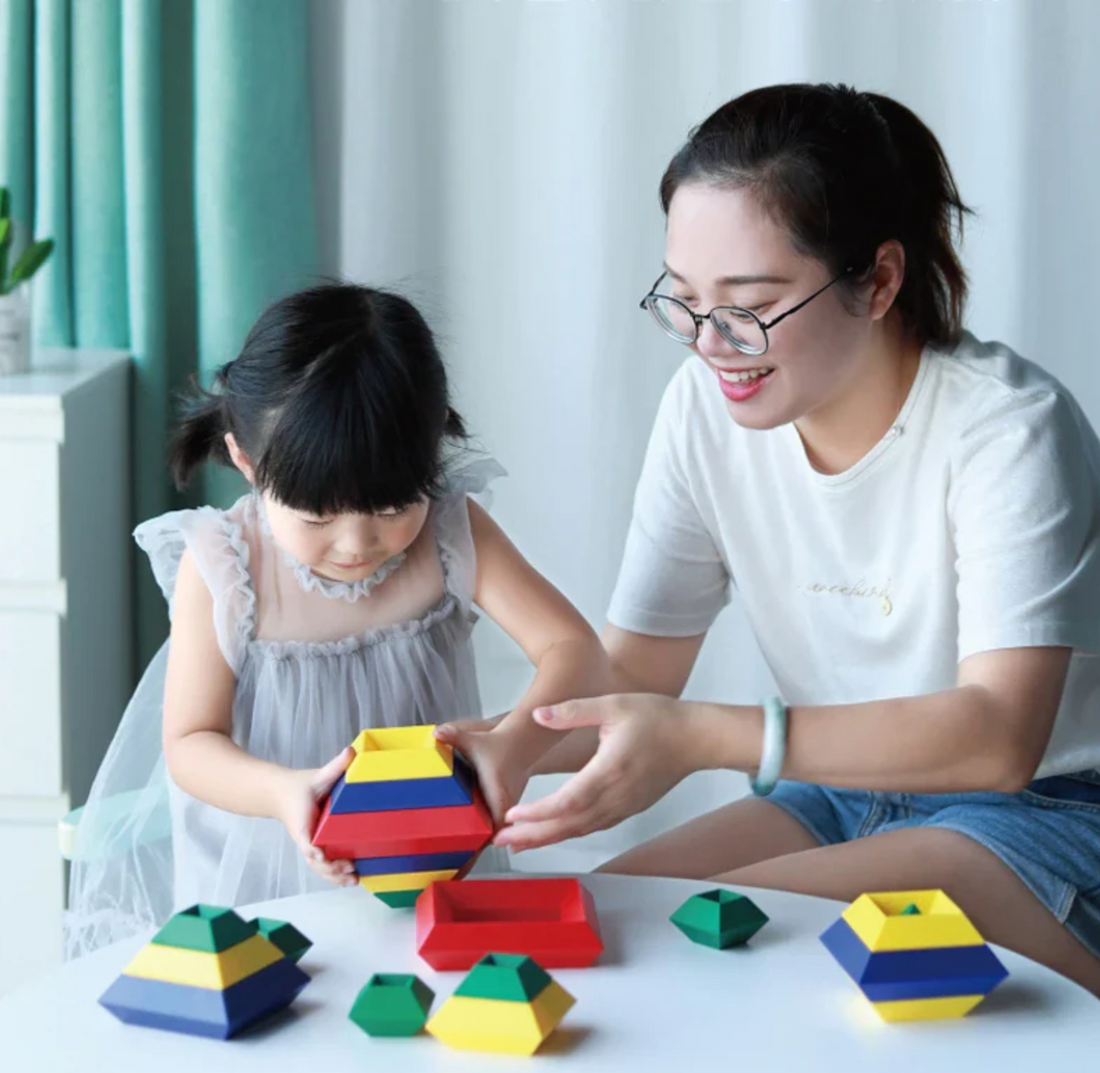The Magic of Stacking: How Simple Blocks Build Complex Brains

Your toddler just spent twenty minutes carefully stacking blocks, only to squeal with delight as they came crashing down. Again. And again. And again. While this might seem like simple play, there's actually profound learning happening in these moments.
"Block play is one of the most powerful tools for early brain development," explains Dr. Sarah Lytle, Director of Outreach and Education at the Institute for Learning & Brain Sciences (I-LABS). "When children stack and build, they're not just playing – they're developing spatial reasoning skills that will later support their understanding of mathematics, science, and engineering."
The Science Behind the Stack
That gleam in your child's eye as they place one block perfectly on top of another isn't just joy – it's their brain making powerful connections. Dr. Jeffrey Trawick-Smith's research at Eastern Connecticut State University found that "children who engage in sophisticated block play at age 3 show significantly higher mathematical achievement by age 5. The spatial reasoning developed through block play directly translates to mathematical thinking."
Every time your little one builds and demolishes, they're learning:
- Cause and effect relationships
- Basic physics principles
- Spatial awareness
- Problem-solving strategies
- Mathematical concepts
Why Block Play Matters More Than You Think
Dr. Dimitri Christakis, Director of the Center for Child Health, Behavior and Development at Seattle Children's Research Institute, puts it perfectly: "What makes block play so valuable is its multi-dimensional nature. A child stacking blocks is simultaneously developing fine motor skills, spatial reasoning, executive function, and problem-solving capabilities. It's like a full-brain workout in play form."
At Kids Get Smart, we've designed our Smart 3D Builders Blocks with these developmental benefits in mind. Each block becomes a tool for learning:
Fine Motor Development
- Precise gripping and releasing
- Hand-eye coordination
- Finger strength and dexterity
Cognitive Skills
- Pattern recognition
- Spatial relationships
- Basic engineering concepts
Social-Emotional Growth
- Frustration tolerance
- Success celebration
- Problem-solving persistence
The Building Blocks of Brain Development
"Watch a child play with blocks over time, and you'll see their cognitive development unfold before your eyes," notes Dr. Kathy Hirsh-Pasek, Professor of Psychology at Temple University. "They start with simple stacking, move to bridging gaps, and eventually create complex structures – each stage reflecting new neural connections and understanding."
Development Stages You'll Notice:
- Simple Stacking (12-18 months)
- Building with Purpose (18-24 months)
- Creating Patterns (2-2.5 years)
- Complex Construction (2.5-3 years)
Making the Most of Block Play
Dr. Roberta Michnick Golinkoff, Professor of Education at the University of Delaware, emphasizes the parent's role: "The key to maximizing learning during block play isn't about teaching – it's about asking the right questions and providing gentle guidance. When parents ask 'What do you think will happen if...?' they're helping children develop scientific thinking skills."
Try These Engagement Strategies:
- Ask Open-Ended Questions:
- "What are you going to build next?"
- "How else could we stack these?"
- "What might make the tower stronger?"
- Introduce Mathematical Concepts Naturally:
- Count blocks together
- Compare heights ("This tower is taller!")
- Discuss shapes and colors
- Support Problem-Solving:
- Let them work through challenges
- Offer gentle suggestions when asked
- Celebrate creative solutions
Choosing the Right Blocks
Dr. Rachel White, Assistant Professor of Psychology at Hamilton College, emphasizes the importance of quality: "Not all toys are created equal. Research shows that open-ended toys like blocks, especially those designed with developmental stages in mind, promote longer periods of engagement and more complex play scenarios than electronic toys with predetermined outcomes."
Our Smart 3D Builders Blocks are specifically designed to:
- Support proper grip development
- Encourage extended play
- Enable increasingly complex building
- Ensure safe exploration
- Grow with your child's abilities
The Long-Term Impact
Recent research from Dr. Marina Umaschi Bers at the Early Childhood Research Institute reveals: "Children who engage in regular constructive play with blocks and similar materials show stronger problem-solving skills, better spatial visualization, and increased engineering thinking by elementary school age."
Creating the Optimal Building Environment
To maximize these benefits:
- Provide Clear Space
- A stable, flat surface
- Adequate building room
- Safe demolition area
- Organize Materials
- Keep blocks easily accessible
- Sort by size if helpful
- Maintain a manageable quantity
- Allow Ample Time
- Avoid rushing building sessions
- Enable repeated experimentation
- Support sustained focus
Investment in the Future
As Dr. Trawick-Smith's research shows, "The time spent in block play during early childhood has a direct correlation with spatial reasoning skills that become crucial in STEM fields later in life."
Taking the Next Step
Ready to support your child's development through purposeful play? Our Smart 3D Builders Blocks provide the perfect foundation for learning. Designed by child development experts and tested by real families, they offer the ideal combination of fun and function.
Explore our Smart 3D Builders Blocks collection and watch your little architect's skills grow! Use code BLOCKS15 for 10% off your first set.
Remember: Every tower built and knocked down is a step toward understanding. Every block placed is a new neural connection formed. And every play session is an investment in your child's future.
Share this article with fellow parents who want to understand the science behind their child's play!
#ChildDevelopment #LearningThroughPlay #EarlyEducation #SmartPlay #KidsGetSmart





















